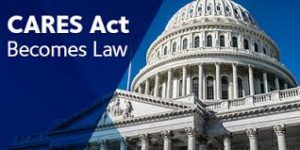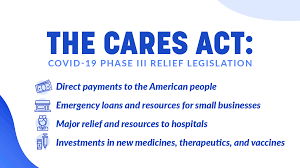By Stephen Tweed 
The Congress of the United States has passed three new laws in the past three weeks to help our contry cope with the crisis created by Covid-19 – The Coronavirus. And President Donald Trump has sighed them into law. Here’s a quick summary of each law:
The Coronavirus Preparedness and Response Supplemental Appropriations Act 2020.
The bill, signed into law by The President on March 6, 2020 provides funding for various agencies of the US Government.
The majority ($6.2 billion) is for the Department of Health and Human Services (HHS) including:
- $3.4 billion for the Office of the Secretary – Public Health and Social Services Emergency Fund (PHSSEF)
- $1.9 billion for the Centers for Disease Control and Prevention (CDC)
- $836 million for the National Institute of Allergy and Infectious Diseases (NIAID)
- $61 million for the Food and Drug Administration (FDA)
There is also $20 million is for the Small Business Administration (SBA) disaster loans program
$1.6 billion is designated for the international response:
- $986 million, is provided to the United States Agency for International Development (USAID) including funding provided through:
- $435 million for the Global Health Programs (GHP)
- $300 million for the International Disaster Assistance (IDA) account
- $250 million for the Economic Support Fund (ESF) account to support economic, security and stabilization efforts resulting from the coronavirus outbreak
There is also $1 million for the Office of the Inspector General (OIG) for oversight of coronavirus response activities.
Families First Coronavirus Response Act
Signed into law by President Trum on March 18, 2020, this law provides:
- DIVISION A—SECOND CORONAVIRUS PREPAREDNESS AND RESPONSE SUPPLEMENTAL APPROPRIATIONS ACT, 2020
- DIVISION B—NUTRITION WAIVERS
- DIVISION C—EMERGENCY FAMILY AND MEDICAL LEAVE EXPANSION ACT
- DIVISION D—EMERGENCY UNEMPLOYMENT INSURANCE STABILIZATION AND ACCESS ACT OF 2020
- DIVISION E—EMERGENCY PAID SICK LEAVE ACT
- DIVISION F—HEALTH PROVISIONS
- DIVISION G—TAX CREDITS FOR PAID SICK AND PAID FAMILY AND MEDICAL LEAVE
This new law will have significant economic impact on home care companies as it requires paid medical leave for companies between 50 and 500 employees. We will be bringing you some expert guidance in how to navigate the provisions of this law that will affect you.
The Coronavirus Aid, Relief, and Economic Security Act (CARES) 
This law was signed by The President on March 27, 2020. It provides $2.2 Trillion in stimulus funds, which is the largest federal response to a crisis in the history of our country.
Here is a very brief summary. We will be bringing you more details as we are able to get expert guidance in understanding this law and how it will affect the home care industry.
- Ensures that all testing for COVID-19 is covered by private insurance plans, with free coverage of a vaccine within 15 days
for COVID-19 when such a vaccine is available. - For eligible small businesses, sole proprietors, independent contractors, and other self-employed individuals, the Act
provides $349 billion through federally backed loans under a modified and expanded Small Business Administration (SBA)
7(a) loan guaranty program. These loans can be used to pay for utilities, rent, mortgage, and payroll. Borrowers are eligible
for loan forgiveness for the first 8 weeks of the loan. The Small Business Administrator has no more than 15 days after the
date of enactment to issue regulations. - The measure provides $500 billion to the Department of Treasury’s exchange stabilization fund for use in loans, loan
guarantees, and other investments for distressed businesses that do not qualify for the small business relief. This includes
direct lending of $25 billion for passenger air carriers, $4 billion for cargo air carriers, and $17 billion for businesses
determined to be important to national security. The remaining $454 billion is eligible for direct lending to distressed
businesses meeting specified criteria. These provisions also include prohibitions on recipients of relief engaging in stock
buybacks, and all loans must be used to retain at least 90 percent of the workforce. - For those who lost employment because of the pandemic, the measure provides robust unemployment insurance, including
for self-employed, independent contractors, and those with limited work history. The assistance will include an additional
$600 per week for each recipient and provides an additional 13 weeks of benefits to those who remain unemployed after
state unemployment benefits are no longer available. - U.S. individual taxpayers with an adjusted gross income of up to $75,000 ($150,000 joint) are eligible for a full $1,200
($2,400 joint) rebate, and an additional rebate of $500 per child. Americans will not be required to do anything to receive
a rebate check, as the IRS will use a taxpayer’s 2019 tax return or their 2018 return if they have not yet filed. The rebate is
reduced by $5 for each $100 of the taxpayer’s income that exceeds $75,000 and completely phases out at $99,000.
More Information in Weekly Video Meetings
To keep you up to date on the latest developments around Covid-19 and its impact on the home care industry, Leading Home Care and the Home Care CEO Forum will be offering two weekly video meetings.
The Monday Mastermind Meeting will be for members of the Home Care CEO Forum Home Care Mastermind Groups. The Home Care CEO Forum is a place for CEOs in the top tier of home care to connect with one another to share ideas, solve problems, and support one another. We currently have four Mastermind Groups with forty two companies as members.
Monday Mastermind Meeting will be on Mondays at 4:00 pm eastern time. Members of our mastermind groups will receive a personal invitation by email.
Mastermind Members DO NOT Need to Register.
Office Hours with Stephen Tweed will be a one-hour video meeting open to any owner or CEO of a home care company. These video meetings will be at 4:00 pm eastern time each Thursday, and will be open to the first 100 participants to login. To receive an invitation to Office Hours with Stephen Tweed, you will need to register in advance at the link below:





